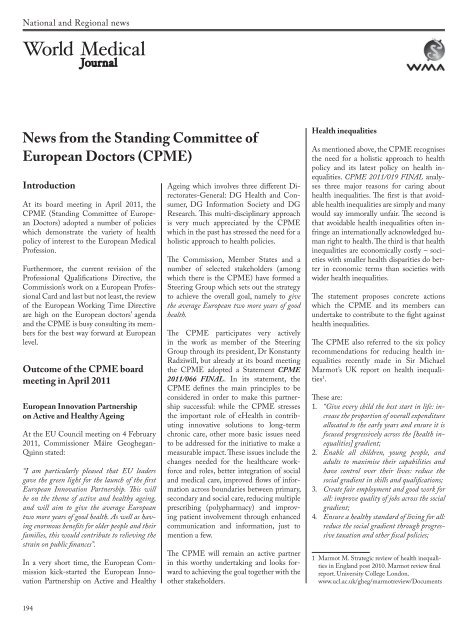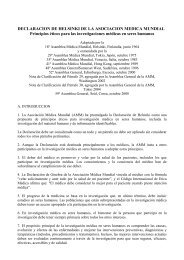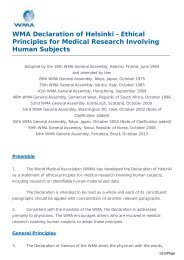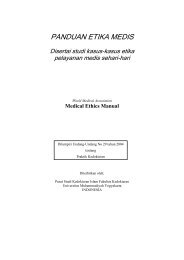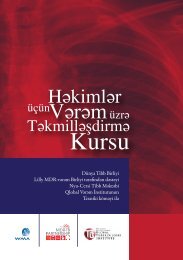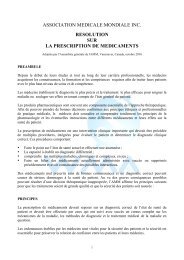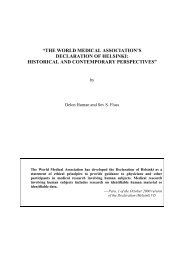WMJ 05 2011 - World Medical Association
WMJ 05 2011 - World Medical Association
WMJ 05 2011 - World Medical Association
Create successful ePaper yourself
Turn your PDF publications into a flip-book with our unique Google optimized e-Paper software.
National and Regional news<br />
News from the Standing Committee of<br />
European Doctors (CPME)<br />
Introduction<br />
At its board meeting in April <strong>2011</strong>, the<br />
CPME (Standing Committee of European<br />
Doctors) adopted a number of policies<br />
which demonstrate the variety of health<br />
policy of interest to the European <strong>Medical</strong><br />
Profession.<br />
Furthermore, the current revision of the<br />
Professional Qualifications Directive, the<br />
Commission’s work on a European Professional<br />
Card and last but not least, the review<br />
of the European Working Time Directive<br />
are high on the European doctors’ agenda<br />
and the CPME is busy consulting its members<br />
for the best way forward at European<br />
level.<br />
Outcome of the CPME board<br />
meeting in April <strong>2011</strong><br />
European Innovation Partnership<br />
on Active and Healthy Ageing<br />
At the EU Council meeting on 4 February<br />
<strong>2011</strong>, Commissioner Máire Geoghegan-<br />
Quinn stated:<br />
“I am particularly pleased that EU leaders<br />
gave the green light for the launch of the first<br />
European Innovation Partnership. This will<br />
be on the theme of active and healthy ageing,<br />
and will aim to give the average European<br />
two more years of good health. As well as having<br />
enormous benefits for older people and their<br />
families, this would contribute to relieving the<br />
strain on public finances”.<br />
In a very short time, the European Commission<br />
kick-started the European Innovation<br />
Partnership on Active and Healthy<br />
Ageing which involves three different Directorates-General:<br />
DG Health and Consumer,<br />
DG Information Society and DG<br />
Research. This multi-disciplinary approach<br />
is very much appreciated by the CPME<br />
which in the past has stressed the need for a<br />
holistic approach to health policies.<br />
The Commission, Member States and a<br />
number of selected stakeholders (among<br />
which there is the CPME) have formed a<br />
Steering Group which sets out the strategy<br />
to achieve the overall goal, namely to give<br />
the average European two more years of good<br />
health.<br />
The CPME participates very actively<br />
in the work as member of the Steering<br />
Group through its president, Dr Konstanty<br />
Radziwill, but already at its board meeting<br />
the CPME adopted a Statement CPME<br />
<strong>2011</strong>/066 FINAL. In its statement, the<br />
CPME defines the main principles to be<br />
considered in order to make this partnership<br />
successful: while the CPME stresses<br />
the important role of eHealth in contributing<br />
innovative solutions to long-term<br />
chronic care, other more basic issues need<br />
to be addressed for the initiative to make a<br />
measurable impact. These issues include the<br />
changes needed for the healthcare workforce<br />
and roles, better integration of social<br />
and medical care, improved flows of information<br />
across boundaries between primary,<br />
secondary and social care, reducing multiple<br />
prescribing (polypharmacy) and improving<br />
patient involvement through enhanced<br />
communication and information, just to<br />
mention a few.<br />
The CPME will remain an active partner<br />
in this worthy undertaking and looks forward<br />
to achieving the goal together with the<br />
other stakeholders.<br />
Health inequalities<br />
As mentioned above, the CPME recognises<br />
the need for a holistic approach to health<br />
policy and its latest policy on health inequalities.<br />
CPME <strong>2011</strong>/019 FINAL analyses<br />
three major reasons for caring about<br />
health inequalities. The first is that avoidable<br />
health inequalities are simply and many<br />
would say immorally unfair. The second is<br />
that avoidable health inequalities often infringe<br />
an internationally acknowledged human<br />
right to health. The third is that health<br />
inequalities are economically costly – societies<br />
with smaller health disparities do better<br />
in economic terms than societies with<br />
wider health inequalities.<br />
The statement proposes concrete actions<br />
which the CPME and its members can<br />
undertake to contribute to the fight against<br />
health inequalities.<br />
The CPME also referred to the six policy<br />
recommendations for reducing health inequalities<br />
recently made in Sir Michael<br />
Marmot’s UK report on health inequalities<br />
1 .<br />
These are:<br />
1. “Give every child the best start in life: increase<br />
the proportion of overall expenditure<br />
allocated to the early years and ensure it is<br />
focused progressively across the [health inequalities]<br />
gradient;<br />
2. Enable all children, young people, and<br />
adults to maximise their capabilities and<br />
have control over their lives: reduce the<br />
social gradient in skills and qualifications;<br />
3. Create fair employment and good work for<br />
all: improve quality of jobs across the social<br />
gradient;<br />
4. Ensure a healthy standard of living for all:<br />
reduce the social gradient through progressive<br />
taxation and other fiscal policies;<br />
1 Marmot M. Strategic review of health inequalities<br />
in England post 2010. Marmot review final<br />
report. University College London.<br />
www.ucl.ac.uk/gheg/marmotreview/Documents<br />
194


